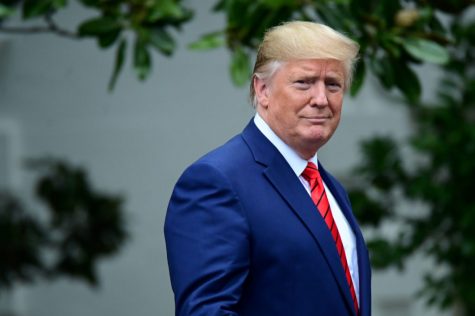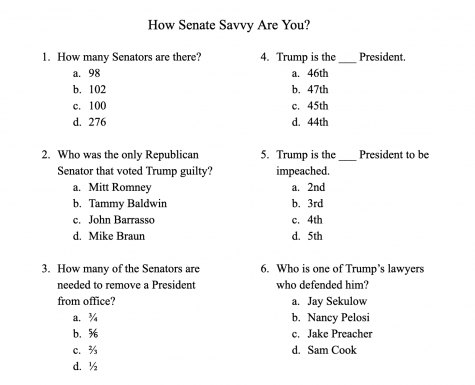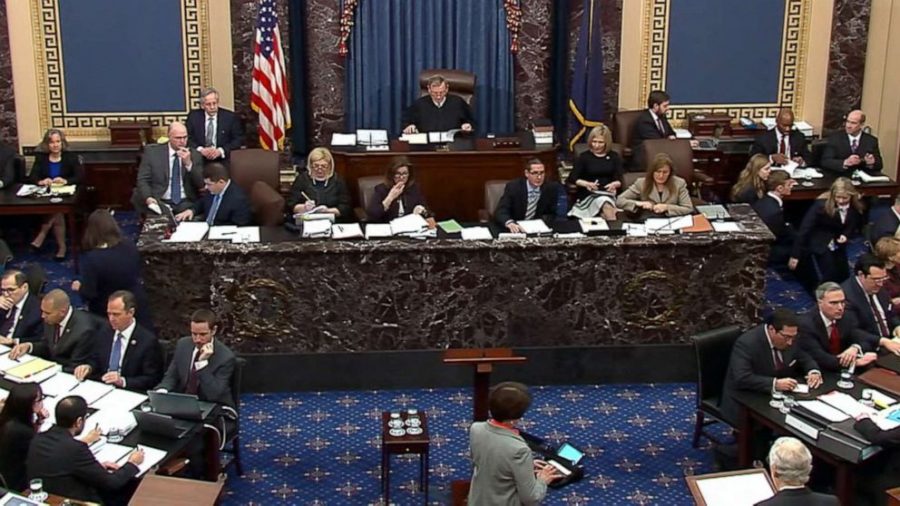Trump’s Turmoil
President Donald Trump’s Senate Impeachment Trial
Senate Impeachment Trial in a session. Photo courtesy of https://abcnews.go.com/Politics/trump-impeachment-trial-live-updates-questions-resume-gop/story?id=68639038.
The president of the United States, a position that has seen forty-five terms, is the head of the executive branch. It is currently in the hands of Donald John Trump. However, not even the president is subject from the law.
Impeachment trials occur twice: once in the House of Representatives, where Trump was deemed guilty, and then in the Senate, where he was recently acquitted from charges.
The trial in the Senate lasted from January 21st to February 5th, during which Trump was tried for abuse of power and obstruction of Congress.
The Democrats argued that Trump’s involvement in a quid pro quo, a favor given to another in return for something else, and Trump’s deliberate refusal to hand over financial documents following multiple House subpoenas, writs summoning documents or other evidence to court, were impeachable.

On the first day of the trial on January 21st, Majority Leader Mitch McConnell established the trial’s protocol and procedures, such as prohibiting witnesses in the trial. California senator Adam Schiff began the Democratic offense by arguing how Trump would interfere in the 2020 election if he remained in office.
The Democrats ended their final arguments with a passionate speech by Schiff who said, “If you find him guilty, you must find that he should be removed.”
On the fifth day, January 26th, Trump’s lawyers began their defense by turning the blame on the Democrats. They argued that the Democrats were the ones interfering with the 2020 Presidential Election.
In the rest of the Republican defense, Trump’s lawyers stated that his offenses, such as the quid pro quo and refusal to follow subpoenas, were not impeachable offenses because they were not criminal acts.
On February 5th, Donald Trump was acquitted from the impeachment charges. The vote for the first article, abuse of power, was 48-52, finding Trump not guilty. The vote for the second article, Obstruction of Congress, was 47-53, also finding him not guilty.
Long Reach’s Opinion
The entirety of the trial contained many controversial events and topics. Some individuals have their own take on what happened in the trial and the voting.
Alejandro Cabrera, a sophomore, expressed his opinion about the Democrats’ performance. “I think the Democrats did what they could with the resources available, but the lack of witnesses made it very difficult to put a strong case together against impeachment,” stated Cabrera.
The Democrats had the odds against them as shown by Trump’s approval rating, which has risen since the start of the trial.
Others such as Christian Walker, a sophomore, had different opinions on their performance: “I don’t think the democratic side proved their case well.” He explained that “the articles were rushed and there wasn’t anything too damning.”
Perhaps a factor is that Nancy Pelosi, the Speaker of the House of Representatives, wanted the articles to be passed in the House by Christmas.
Cabrera also assessed the lawyers and said, “I do not think [Trump’s] team defended the case well [because they failed to] prove there was no quid pro quo in his actions.”
Almost all of the senators agreed that Trump was guilty, but the Republican defense questioned whether it was actually an impeachable offense.

Chloe Mentz, a sophomore, believed that “the defense wanted to turn the blame onto the Democrats instead of arguing against their claims.”
After the acquittal, Walker wasn’t surprised and believed that the Republicans had the advantage from the beginning.
Mentz agreed, saying, “I wasn’t really surprised about it because they ruled against witnesses, so there wasn’t any strong evidence.”
One of the more memorable moments from the trial was Schiff’s closing speech. Schiff became emotional during his argument, which caught the eye of many such as Walker.
Walker described the testimony as “absolutely breathtaking,” and was impressed with how well-spoken it was.
For example, in his testimony, Schiff said, “Can you have the least bit of confidence that Donald Trump will stand up to [the Russians] and protect our national interest over his own personal interest?” He continued, “You know you can’t, which makes him dangerous to this country.”
The trial has commenced and Trump is officially free from the dangerous waters of impeachment. Although it may not have been the most exciting and desired trial that some may have wanted, it certainly was an historical occasion.


![Photo Courtesy of
A teen faces colorism at school and at home in 'Genesis Begins Again'
[Photograph]. (n.d.). NPR.https://www.npr.org/2019/01/31/690381040/a-teen-faces-colorism-at-school-and-at-home-in-genesis-begins-again
A complex-ion issue: Colorism [Photograph]. (n.d.). The Chronicle. https://hwchronicle.com/55860/features/a-complex-ion-issue-colorism/
The colorism issue [Photograph]. (n.d.). Issuu. https://issuu.com/overachievermagazine/docs/colourism
_issue_om](https://lrhslightningflash.com/wp-content/uploads/2021/06/Colorism-is-alive-475x380.jpg)
![Long Reach Boosters Club. (March 24, 2023 - 11:33pm). [Digital Image]. Long Reach Has Talent Show Spring 2023. Facebook, Retrieved April 17, 2023 from https://www.facebook.com/longreachboosters/posts/pfbid03kN5BKQj5TDefz1rtVZ5fTBBhjwA39UPPd8GctyMgFvY7B4RihH4rY4EqE7xPwikl.](https://lrhslightningflash.com/wp-content/uploads/2023/05/LR-Talent-Show-3-475x316.jpg)

